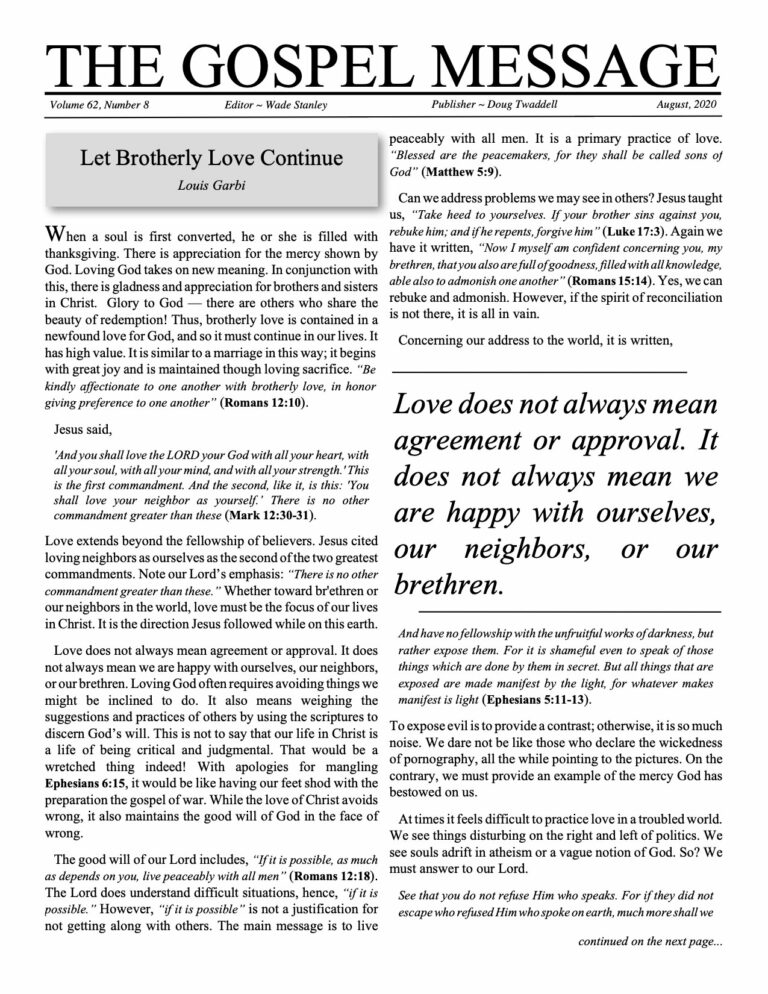A Bad Day
Who wants to be known for who they were in their worst moments? A snapshot in time, a moment of weakness, or a careless word can permanently change our view of someone.
Who wants to be known for who they were in their worst moments? A snapshot in time, a moment of weakness, or a careless word can permanently change our view of someone.
Jesus is coming back. His return may be sudden, but it will not be secret. It will be visible to all, audible to all, and its accompanying judgment will be final for all. And that finality is why it’s so important to be aware of the errors of the doctrine we’ve been examining. By promising two returns, the doctrine of “the Rapture” promises people a second chance—another seven years, according to LaHaye, another three and a half years, according to others—but a second chance all the same.
Often throughout history, God’s people are called to overcome, and the current times seem to strongly call us to that. It is easy to miss how closely the reality of biblical lives parallels what can occur in ours and, in so doing, we diminish the modern contained in the journeys of the old saints. We fail to see that, in the midst of their distresses, they exhibited some of their greatest worship.

“Let Brotherly Love Continue,” by Louis Garbi; “Election Year,” by Rick Sparks; “Influence,” by Tom Allen.
It is true that some people may have a greater sphere of influence than others, but there is no one who has no influence at all. We all have some influence or effect on other people. That influence can take different forms as we live our lives. We influence others with our speech, with our actions and with our lives. People listen to what we say and how we say it and what kind of person we are. They see what we do and determine what is important to us. They may look at our lives and modify their lives based on what they see in us. We will have an influence on others.
Brotherly love and loving our neighbor as ourselves seem close, almost the same. There is a distinction, in that brotherly love is a direct result of salvation. It comes from our being a part of God’s family, “the Beloved” (Ephesians 1:6). We have a shared identity and appreciation. Whereas loving our neighbor is the ministry of Christ to a world in need: “Love does no harm to a neighbor; therefore love is the fulfillment of the law” (Romans 13:10). For the sake of all, love means appreciating others for the goodness they possess, or the potential for goodness which everyone has. It means trying to understand others – to see their point of view, then to act accordingly. We must leave the condemnation of others to God. It is not our place. In light of the ministry of Jesus, we can say that even Jesus sustains the hope of reconciliation to all without condemnation. Don’t you think His intent was on what we could become (our potential) rather than what we were? Didn’t that make our salvation possible? “For God did not send His Son into the world to condemn the world, but that the world through Him might be saved” (John 3:17). “And if anyone hears My words and does not believe, I do not judge him; for I did not come to judge the world but to save the world” (John 12:47).
In Philippians 4, Paul talks about dealing with the extremes of life and working toward an attitude that in all things we do our best to be content with our surroundings. There will be times when things are going great, and times when they are not. But these types of things need to be placed in perspective when compared to our spiritual lives. Bad times are by definition, bad; but maybe they are also times that we can use to try and refocus our efforts and to push aside the day to day distractions that so easily seem to consume us. Maybe this is a time to meditate on where we are today and the direction of our lives, and see if any changes need to be made. Maybe times like these are OUR three days of blindness, so that we can emerge on the other side with a better spiritual perspective.
Has the Lord ever disappointed you? Probably, because his timing and his plan aren’t always just what we want. “Lord, if you had been here…” Yet there is no doubt that he cares, he sympathizes, he shares the hurts and griefs, and he wants us to trust him no matter what happens, so that, as he did that day, he can show everyone who believes in him “the glory of God” (John 11:40).
Immediately after this crisis began, it became apparent the vast majority of the Lord’s congregations were not going to be able to publicly assemble at any time for a while. Yes, a very few could continue to meet legally due to their very small numbers, but the vast majority of churches could not meet. Of course, we understand this was an attempt to lessen the number of infections and fatalities at the same time or to “flatten the curve” as it is being called in the general population.
Think of the sun. (Ensure you are wearing your mental sunglasses!). In the morning, it rises and provides light for the world all day long and then sets at night. If we go out at night, we might see the moon. And there is light from the moon but that light is REFLECTED light. The source of the light is still the sun, which is shining on the moon and then being redirected towards us.